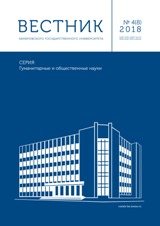Kemerovo, Russian Federation
Kemerovo, Russian Federation
The relevance of the present research comes from the need to reveal the primary personality type that is prevalent in the historical and social reality. On the one hand, the inherent antinomic condition directly connects the individual with the outside world. On the other hand, there is always some immanent content that remains within the individual, and reveals itself as their existential essence. In revealing the problem, the authors appeal to the existential personality type that vividly illuminates the social world in its objective component. The existential man is regarded as a type of personality whose subjective temporality prevails in relation to the objective historical time that is able to transcendence and embodies itself into the status of a free individual. The paper justifies such an important parameter of existential human as special historical memory based on the ability to go beyond the boundaries of one’s own being and get actively involved in the historical process while being aware of the responsibility to the world of others.
existential personality type, personality, transcendence, social, real being, historical memory
1. Barulin V. S. Chelovek i obshchestvennyi mir kak sistema [Man and society in a context of social-philosophical anthropology]. Lichnostʹ. Kulʹtura. Obshchestvo = Personality. Culture. Society, 7, no. 2 (2005): 208-234.
2. Ivin A. A. Chelovek, tvoriashchii istoriiu. Novaia filosofiia istorii [A person who makes history. New philosophy of history]. Moscow: Prospekt, 2018, 144.
3. Kutyrev V. A. Sova Minervy vyletaet v sumerki. Izbrannye filosofskie teksty XXI veka [The Owl of Minerva flies at dusk. Selected philosophical texts of the XXI century]. Saint-Petersburg: Aleteiia, 2018, 526.
4. Durkheim E. Sotsiologiia. Ee predmet, metod, prednaznachenie [Sociology. Its subject, method, and purpose]. Moscow: Kanon, 1995, 352.
5. Bauman Z. Individualizirovannoe obshchestvo [Individualized society]. Moscow: Logos, 2002, 390.
6. Fromm E. Begstvo ot svobody [Escape from freedom]. Moscow: Progress, 1989, 272.
7. Abbagnano N. Ekzistentsiia kak svoboda [Existence as freedom]. Voprosy filosofii = Philosophy Questions, no. 8 (1992): 48-64.
8. Heidegger M. Razgovor na proselochnoi doroge [Conversation on a country road]. Moscow: Vysshaia shkola, 1991, 192.
9. Zhukova O. I. Sovremennoe obshchestvo i mesto v nem cheloveka [Modern society and human's place in it]. Vestnik Tomskogo gosudarstvennogo universiteta = Tomsk State University Journal, no. 300-1 (2007): 47-50.
10. Jaspers K. Dukhovnaia situatsiia vremeni [Spiritual situation of the time]. Jaspers K. Smysl i naznachenie istorii [Meaning and purpose of history]. Moscow: Politizdat, 1991, 288-419.
11. Zhukova O. I. Samostʹ cheloveka kak predmet sotsialʹno-filosofskogo analiza [The human self as a subject of social and philosophical analysis]. Kemerovo: Kemerovskii gos. un-t, 2009, 182.
12. Chesterton G. Izbrannoe [Favorites]. Moscow: Terra, 1996, 592.
13. Mamardashvili M. Kak ia ponimaiu filosofiiu [The way I understand philosophy]. Moscow: Progress, 1992, 416.
14. Jaspers K. Istoki istorii i ee tselʹ [The origins of history and its purpose]. Jaspers K. Smysl i naznachenie istorii [The meaning and purpose of history]. Moscow: Politizdat, 1991, 28-287.
15. Berdiaev N. Samopoznanie [Self-knowledge]. Moscow: AST, 2017, 480.




















